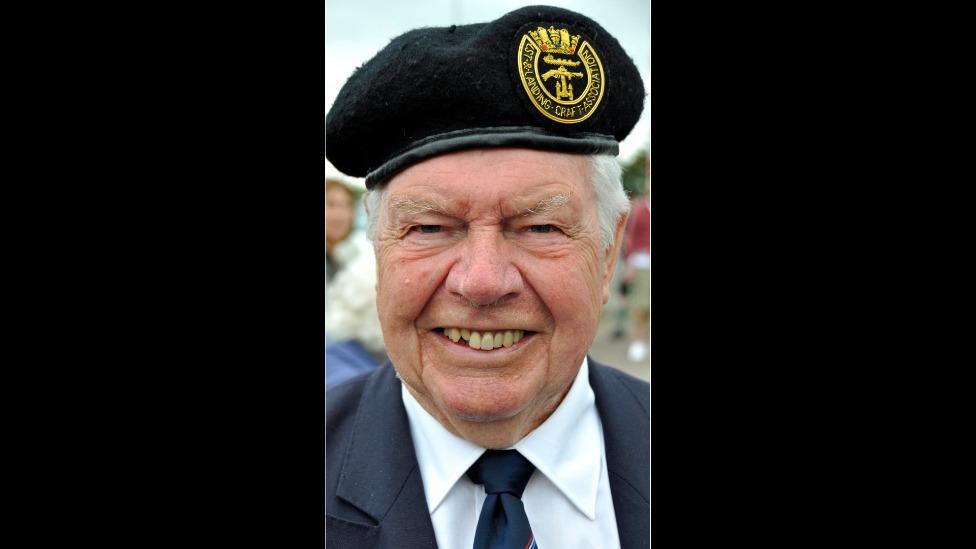D-day veteran dies weeks before 75th anniversary
- Published

Alexander Bryant was one of Scotland's last D-day veterans
One of Scotland's last D-day veterans has died just weeks before the 75th anniversary of the Allied invasion of Nazi-held France.
On 6 June 1944, Alexander Bryant was a young crewman on a landing craft, lowering the ramp as Canadian soldiers stormed ashore on Juno Beach.
Years later at his home near Edinburgh, he recalled: "I was scared. You'd be a liar if you said you weren't. But it was exciting for a lad of that age."
The 93-year-old was gravely ill in hospital three years ago, but recovered after receiving the Legion D'honneur from France.
Early life
London-born Alex described himself as "a true cockney" and remembered Oswald Mosley's blackshirts marching through the city's streets as Europe geared up for war.
The London blitz inspired him to join the Home Guard aged 16. He was, he said, very much the Private Pike character from the BBC's TV series Dad's Army.
Aged 17, and against the advice of his father - a veteran of the First World War - Alex enlisted in the Royal Navy and was posted first to Scotland and then to the south coast of England for training.
Six weeks after his 18th birthday, he played his part in the biggest seaborne invasion in history.
D-Day landings
In his memoirs, Alex wrote: "On D-day we fired our 105mm self-propelled guns for the first time. We were part of the biggest barrage of the war, and the battleships firing over our heads were deafening.
"Our next part was the run into Juno beach at Berniers. My action station was the port winch house at the bow and I had to lower the ramp.
"As we hit the beach, I felt the deck jump about six inches as we hit some mines. Our troops had a relatively dry landing with no casualties. I think we did another three or four runs into the beach on D-day."
Alex later discovered that the mines had exploded directly below where he had been standing.
Honoured
He returned to Scotland soon after the war, married a local girl, Edith Redgrave, and raised his family in South Queensferry, where he helped build the Forth Road Bridge in the 1960s.
In 2016, the French government was in the process of awarding the Legion D'honneur to thousands of the veterans who had liberated their country from the Nazis. Alex was seriously ill with pneumonia when his medal arrived.
At his hospital bedside, his son Billy read the citation to his father. The French said they owed their "freedom and security to your dedication, because you were ready to risk your life".
To the surprise of his family and doctors, he recovered and was allowed home two days later.
"I remember his eyes filled up when I read the citation to him," said Billy.
"I'd never seen that before", he added.
"His GP said to me that he was quite a remarkable guy. He was part of that generation that never complained about anything.
"I think like a lot of the veterans the war shaped his life in a big way. He was able to deal with any adversity. Nothing really fazed him and I think a lot of the veterans were the same."
Alex Bryant is survived by five children, fourteen grandchildren and 10 great-grandchildren.